Inadequate information
Federal Ministry of Information Launches Nationwide Campaign on Government Interventions
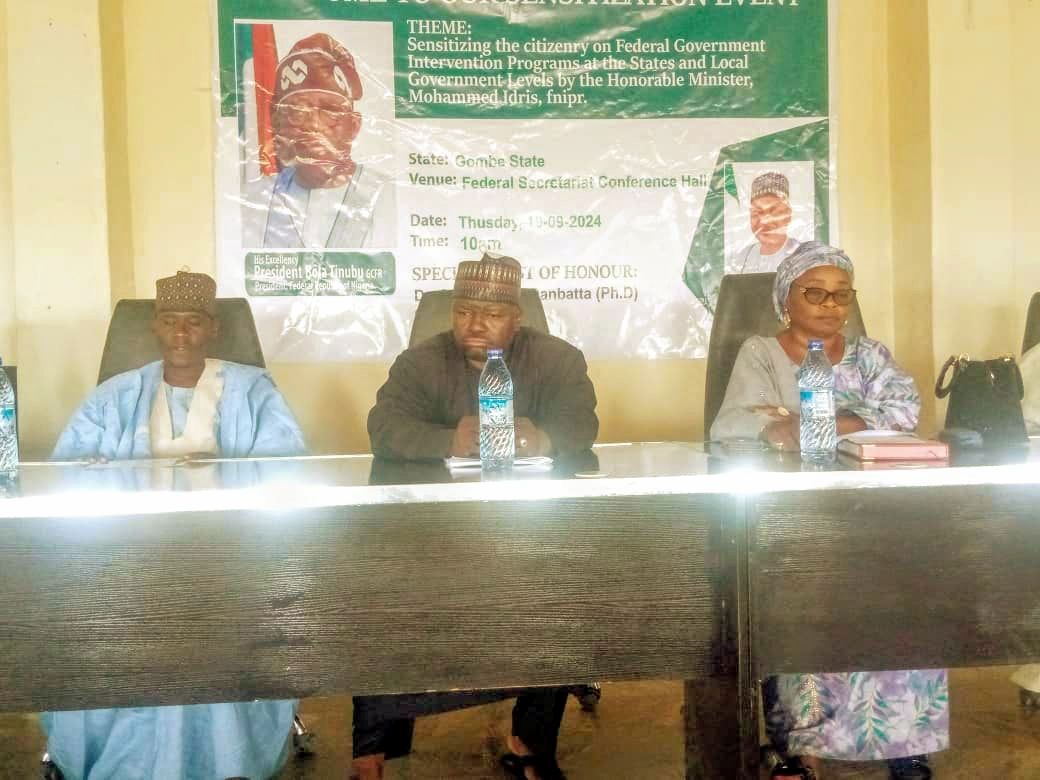
By Muhammad Jamil Abubakar
In a bid to bridge the information gap between the federal government and the public, the Federal Ministry of Information and National Orientation has launched a nationwide campaign aimed at sensitizing Nigerians on various federal government intervention programs. These programs are geared towards improving the socio-economic lives of citizens and boosting the national economy.
The campaign, titled *”Sensitizing the Citizenry on Federal Government Intervention Programs,”* was introduced by the Minister of Information and National Orientation, Muhammad Idris Malagi. Speaking through Istifanus Idi Saluk, Head of the Federal Information Centre in Gombe, the Minister emphasized the need to inform the public about the numerous initiatives being implemented by the government. Many Nigerians, he said, remain unaware of the benefits and opportunities offered by these intervention programs.
Among the key government interventions highlighted during the event are the disbursement of over two billion Naira in student loans, programs aimed at mitigating the hardship caused by the removal of the fuel subsidy, and initiatives to empower young Nigerians between the ages of 18 and 35 with skills, mentorship, and opportunities for leadership development.
Saluk emphasized the ministry’s plan to utilize various communication channels to ensure all segments of society, especially in Gombe State, are informed about these programs. The sensitization efforts are designed to create awareness and ensure that citizens can easily access the benefits provided by the government.
Dr. Garba Ubale Danbatta, the guest speaker at the event and the General Manager of Radio Nigeria Jewel FM Gombe, stressed the importance of the sensitization campaign in promoting transparency and accountability in governance. According to Dr. Danbatta, there is a significant disconnect between the government and the public on many key national issues, including intervention programs. He called for a concerted effort to address this gap, stating that a well-informed citizenry is better positioned to access government initiatives and hold leaders accountable in the event of any infractions.
This campaign is a major step by the Ministry of Information to foster trust between the government and its citizens while promoting effective communication of national policies and programs.

Inadequate information
GSU Alumni General Election Sparks Outcry Over Lack of Transparency and Poor Publicity

By Our Correspondent
The Gombe State University (GSU) Alumni General Election has come under intense criticism following claims of poor publicity, lack of inclusiveness, and concerns about transparency in its conduct.
Despite the significance of the election in shaping the future of the Alumni body, many members within and outside Gombe State say they were left in the dark about the process—from the planning stages to the actual voting. This has raised serious questions about the legitimacy and fairness of the entire exercise.
“How is it that an election of such magnitude is conducted with barely any notice or official communication to the wider alumni body?” asked Abubakar Ahmad Jaja, an active member of the Class of 2015 alumni community and Chief Administrator of the group.
Jaja, who is also a participant in several alumni social groups and football forums involving current leaders, said he found it odd that no announcement was made across platforms where alumni engagements are usually promoted. “We were even invited to play a football match related to the election, yet many of us only learned about it after it had taken place,” he noted.
Lack of Communication
At the heart of the outrage is the apparent failure of the alumni leadership to use available communication channels to inform members. Platforms like Facebook groups, WhatsApp forums, and even official university channels were reportedly silent on the matter. Many alumni claim there was no timeline provided for nominations, no campaigns publicized, and no digital tools adopted to ensure remote participation—especially for those outside Gombe State or the country.
“We live in a digital era where disseminating information is easier than ever. If there was a genuine intent to involve everyone, emails, alumni websites, social media, and messaging apps could have been used effectively. That none of this happened is deeply troubling,” Jaja added.
Concerns of Elitism and Exclusion
Another core issue raised is the dominance of the GSU Alumni leadership by individuals working within Gombe State University itself. Critics argue that this centralization undermines the purpose of the Alumni association, which is to unify graduates from various backgrounds and locations.
“Leadership should not be restricted to a select few simply because they are physically close to the institution. All alumni, regardless of where they are based, have the right to participate equally in the democratic process,” said a former student who preferred to remain anonymous.
This alleged exclusivity, many fear, could alienate members and erode trust in the body tasked with representing the collective interests of all graduates of the university.
Call for Reform and Accountability
The developments have sparked growing calls for a review of the electoral process and broader Alumni governance. Stakeholders are urging the current leadership to take corrective steps that will restore confidence and ensure that future elections are transparent, participatory, and inclusive.
“An inclusive and credible election must involve: proper publicity, an open nomination process, equal access for members across locations, and the use of online platforms for voting or discussions,” said Jaja.
He further emphasized that the credibility of any alumni leadership is rooted in its ability to carry everyone along—not just those within a privileged circle.
Looking Ahead
Alumni across various graduation years are now demanding that the current leadership reflect on the concerns raised and commit to adopting more open, transparent practices going forward. Proposals include creating a centralized alumni portal, regular updates across platforms, broader consultations, and digital voting tools to ensure equal participation.
“The GSU Alumni body belongs to all of us—not just a select few. We must build an association that thrives on fairness, unity, and accountability,” Jaja concluded.
As the university community watches closely, the actions taken by the current leadership in the coming weeks may determine whether the trust of the wider alumni base can be rebuilt—or further eroded.
Abubakar Ahmad Jaja
Class of 2015, Gombe State University
B.Sc(Ed) Mathematics (GSU), M.Ed, PhD (in view), MAU-Yola
Award
Hon. Saidu Hassan Jakusko Resigns from APC Over Alleged Neglect
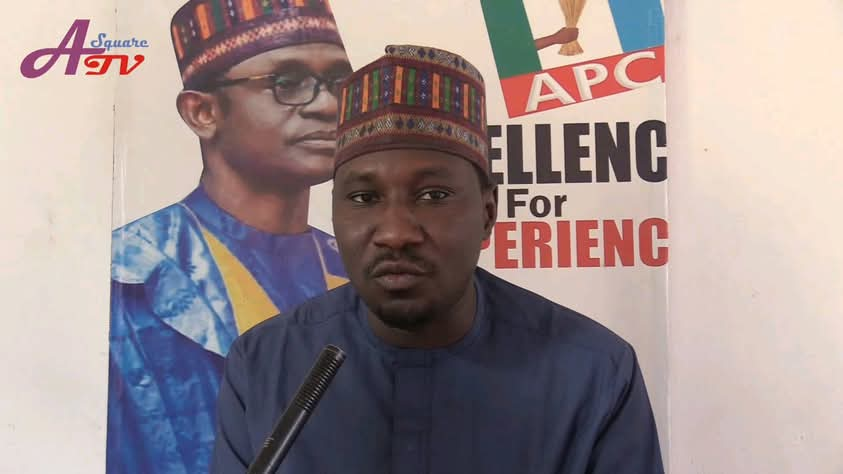
By Muhammad Yakubu Lele, Dramaturu
In a surprising political development, Hon. Saidu Hassan Jakusko, a prominent member of the All Progressives Congress (APC) in Yobe State, has tendered his resignation from the party, citing dissatisfaction with the lack of recognition and support for his contributions.
Jakusko, who served as the Director-General of the APC Youth Awareness Council for Mai Mala Buni during the 2019 gubernatorial campaign, announced his decision in a detailed resignation letter made available to journalists. He expressed disappointment over what he described as years of unreciprocated loyalty and sacrifice for the party.
A Legacy of Dedication
Jakusko recounted his active role in securing the victory of Governor Mai Mala Buni in 2019, emphasizing the sacrifices he and his team made during the rigorous campaign. “We worked tirelessly, investing our time, resources, and energy to secure the victory of Hon. Mai Mala Buni,” he wrote. However, he lamented that his efforts were not acknowledged by the government over the past four years.
Despite this, Jakusko remained loyal to the APC, doubling down on his commitment during the 2023 general elections. He claimed to have facilitated the defection of approximately 600 individuals from opposition parties, including the PDP, APGA, AC, and Labour Party, into the APC.
Alleged Neglect and Unfulfilled Expectations
Jakusko alleged that despite his significant contributions to the party, no tangible support or recognition was extended to him or his constituency. “These decampees were presented to the party leadership, including the APC chairman and other top officials,” he noted, yet his efforts failed to yield the expected acknowledgment or assistance.
The perceived neglect appears to have been the final straw, compelling Jakusko to step away from the party he once served with unwavering dedication.
Appreciation and Forward-Looking Vision
In his resignation letter, Jakusko expressed gratitude to the APC leadership and members in Yobe State for their collaboration over the years. He reaffirmed his commitment to the principles of democracy and the development of his community, even as he embarks on a new political path.
Jakusko’s resignation marks a significant moment for the APC in Yobe State, given his influential role and the political capital he has built over the years. His departure raises questions about internal dynamics within the party and could signal potential challenges in retaining grassroots loyalty.
Implications for Yobe APC
Political analysts suggest that Jakusko’s exit could weaken the APC’s grassroots mobilization efforts in Yobe State, particularly given his history of rallying support across political divides. The move also underscores broader issues of internal dissatisfaction that the APC may need to address to maintain cohesion ahead of future elections.
As Hon. Saidu Hassan Jakusko moves on, the political landscape in Yobe State is set for a potential shift, with both his supporters and critics closely watching his next moves. For now, the APC leadership in the state has yet to issue a formal response to his resignation.
Award
CNG Criticizes Proposed Tax Reform Bill, Calls for Comprehensive Review and Greater Transparency
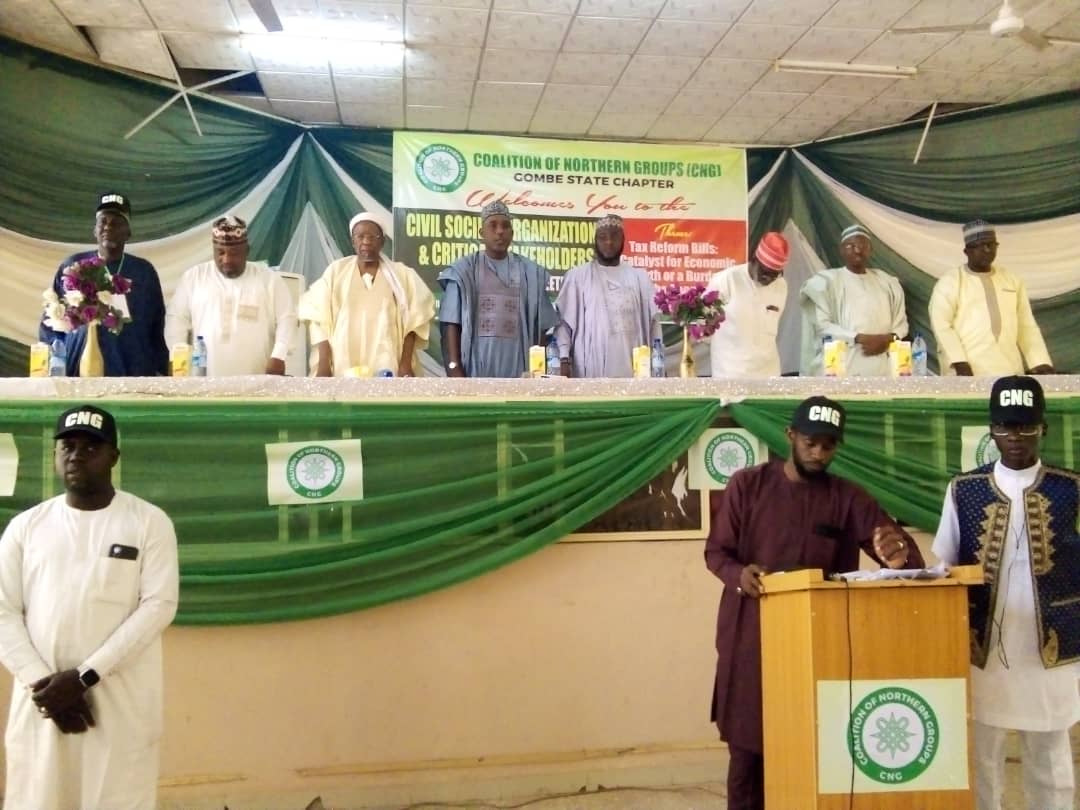
The Coalition of Northern Groups (CNG) has voiced strong opposition to the controversial tax reform bill recently presented by President Bola Ahmed Tinubu to the National Assembly. The organization raised concerns over several provisions in the bill, calling for a thorough review before it is passed into law.
At a town hall meeting held on January 6, 2025, at Gombe State University, Comrade Jamilu Charanchi, the National Coordinator of CNG, outlined the contentious aspects of the bill and urged the Federal Government to provide Nigerians with a clear report on the outcomes of the fuel subsidy removal, as well as a transparent account of how the savings have been utilized.
Speaking at the event, Professor Abubakar Sadiq from the Federal University of Kashere echoed similar concerns, criticizing the government for pushing forward with the bill despite significant opposition from across the country. He stressed that the proposed tax reforms could place undue pressure on Nigerians already facing economic challenges.
The meeting, themed “Tax Reform: A Catalyst for Economic Growth or a Burden on Nigerians,” drew significant participation from civil society organizations and regional representatives. An overwhelming 99% of attendees expressed their opposition to the bill, highlighting widespread dissatisfaction among the public.
Comrade Muhammad Usman Deba, the CNG’s Coordinator for Gombe State, further emphasized the potential negative impact of the tax reform on Northern states. Deba noted that while the bill aims to boost national revenue, it risks disproportionately benefiting Southern states, particularly those with higher economic activities, such as Lagos. This imbalance could reduce the revenue shares allocated to Northern states, exacerbating existing economic disparities and potentially leading to migration and social unrest.
Deba also criticized the lack of data-driven policymaking and transparency, urging the government to provide solid evidence supporting the proposed changes. He called for a more inclusive approach, with a transparent and equitable revenue-sharing formula that involves consultations with stakeholders from all regions.
The CNG concluded by urging the Nigerian Senate to halt deliberations on the bill and engage in more consultations to ensure the reform promotes national unity and balanced development. They emphasized the need for a fair tax system that ensures no region is marginalized in the pursuit of economic growth.
-

 Leadership1 year ago
Leadership1 year agoBreaking: African Union Appoints Pantami as Co-Chair of the 4th Industrial Revolution Policy Council
-
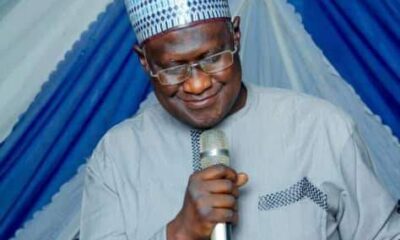
 Appointment11 months ago
Appointment11 months agoGombe State Indigene, Appointed New Vice Chancellor (ATBU)
-

 Politics2 years ago
Politics2 years agoFormer Gombe State APC Promoters Forum Chairman Attacked Following Political Commentary
-
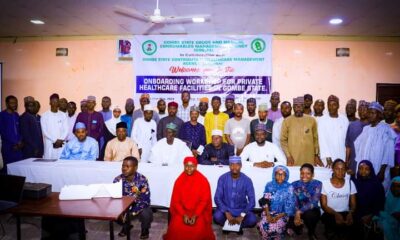
 Health1 year ago
Health1 year agoGombe State Organizes Onboarding Workshop for Private Healthcare Facilities
-
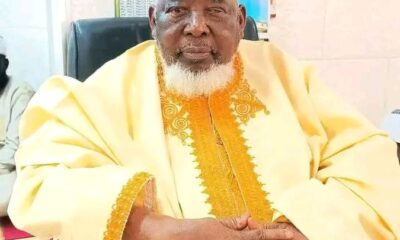
 Death6 months ago
Death6 months agoProminent Nigerian Islamic Scholar, Sheikh Sa’idu Hassan Jingir, Passes Away
-
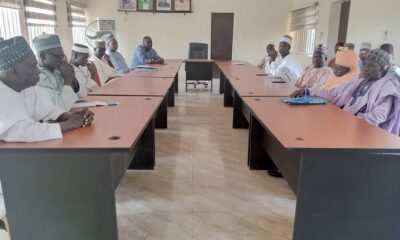
 Water1 year ago
Water1 year agoGombe Government Mobilizes Stakeholders to Combat Illegal Water Connections
-
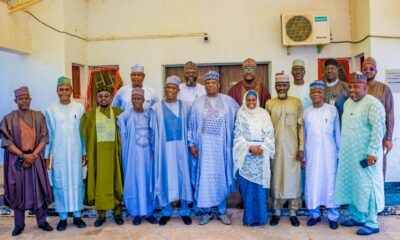
 Politics1 year ago
Politics1 year agoGombe State Inaugurates Human Capital Development Council
-
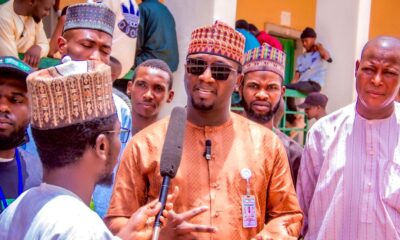
 Politics1 year ago
Politics1 year agoGombe State Launches Presidential Palliative Program (PPP) to Aid Small Businesses